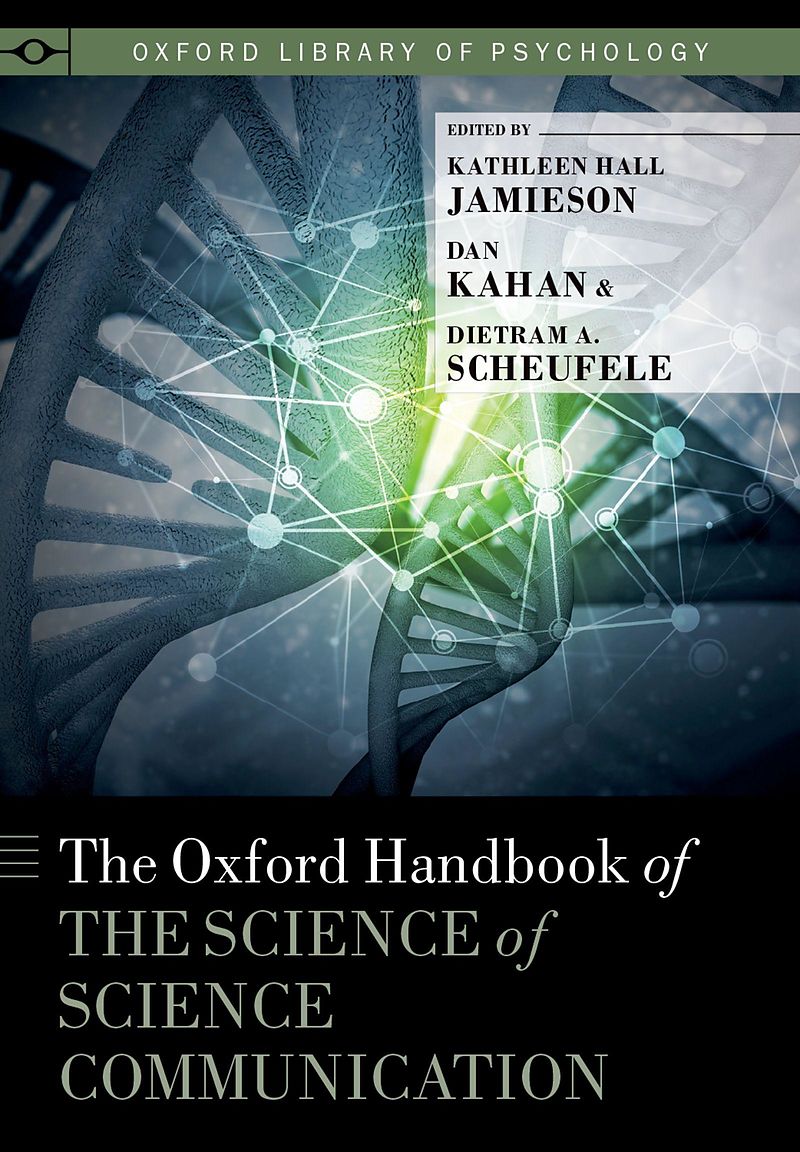The Oxford Handbook of the Science of Science Communication
Einband:
E-Book (pdf)
EAN:
9780190497637
Genre:
Psychologie
Herausgeber:
OUP eBook
Anzahl Seiten:
608
Erscheinungsdatum:
17.05.2017
The proposal to vaccinate adolescent girls against the human papilloma virus ignited political controversy, as did the advent of fracking and a host of other emerging technologies. These disputes attest to the persistent gap between expert and public perceptions. Complicating the communication of sound science and the debates that surround the societal applications of that science is a changing media environment in which misinformation can elicit belief without corrective context and likeminded individuals are prone to seek ideologically comforting information within their own self-constructed media enclaves. Drawing on the expertise of leading science communication scholars from six countries, The Oxford Handbook of the Science of Science Communication not only charts the media landscape - from news and entertainment to blogs and films - but also examines the powers and perils of human biases - from the disposition to seek confirming evidence to the inclination to overweight endpoints in a trend line. In the process, it draws together the best available social science on ways to communicate science while also minimizing the pernicious effects of human bias. The Handbook adds case studies exploring instances in which communication undercut or facilitated the access to scientific evidence. The range of topics addressed is wide, from genetically engineered organisms and nanotechnology to vaccination controversies and climate change. Also unique to this book is a focus on the complexities of involving the public in decision making about the uses of science, the regulations that should govern its application, and the ethical boundaries within which science should operate. The Handbook is an invaluable resource for researchers in the communication fields, particularly in science and health communication, as well as to scholars involved in research on scientific topics susceptible to distortion in partisan debate.
Autorentext
Kathleen Hall Jamieson is the Elizabeth Ware Packard Professor at the Annenberg School for Communication of the University of Pennsylvania and the Walter and Leonore Annenberg Director of its Annenberg Public Policy Center. The author of four award winning Oxford University Press books on political and press communications, she is co-founder of FactCheck.org, which researches the veracity of claims made by political players. Its SciCheck feature was launched in 2015 to expose the misuse of scientific evidence in political discourse. Dan Kahan is the Elizabeth K. Dollard Professor of Law and Professor of Psychology at Yale Law School. He is a member of the Cultural Cognition Project, an interdisciplinary team of scholars who use empirical methods to examine the impact of group values on perceptions of risk and science communication. Dietram A. Scheufele is the John E. Ross Professor in Science Communication and Vilas Distinguished Achievement Professor at the University of Wisconsin-Madison and in the Morgridge Institute for Research. His research deals with the interface of media, policy, and public opinion. Scheufele has co-chaired the National Academies of Sciences, Engineering, and Medicine's Roundtable on Public Interfaces of the Life Sciences, and vice-chaired the recent Academies' consensus report on "Communicating science effectively: A research agenda."
Inhalt
Introduction: Why Science Communication? Editors - Dan Kahan, Dietram Scheufele, and Kathleen Hall Jamieson Part I: THE SCIENCE OF COMMUNICATING SCIENCE 1. The Need for a Science of Science Communication: Communicating Science's Values and Norms Kathleen Hall Jamieson - Elizabeth Ware Packard Professor of Communication and Director, Annenberg Public Policy Center - University of Pennsylvania 2. Overview of the Science of Science Communication Heather Akin - Annenberg Public Policy Center Postdoctoral Fellow in Science of Science of Communication - University of Pennsylvania Dietram Scheufele - John E. Ross Professor of Science Communication and Vilas Distinguished Achievement Professor - University of Wisconsin-Madison, and Morgridge Institute for Research 3. On the Sources of Ordinary Science Knowledge and Extraordinary Science Ignorance Dan Kahan - Elizabeth K. Dollard Professor of Law and Professor of Psychology - Yale University 4. How Changing Media Structures Are Affecting Science News Coverage Mike S. Schäfer - Professor of Science Communication - University of Zürich, Switzerland 5. What the Public Thinks and Knows about Science: And Why It Matters William Hallman - Professor of Human Ecology - Rutgers University 6. Scientific Controversies: Can the Science of Science Communication Provide Management Guidance or only Analysis? Bruce Lewenstein - Professor of Science Communication - Cornell University 7. A Recap: The Science of Communicating Science Joseph Hilgard - Annenberg Public Policy Center Postdoctoral Fellow in Science of Science of Communication - University of Pennsylvania Nan Li - Assistant Professor of Agricultural Education and Communications - Texas Tech University Part II: IDENTIFYING AND OVERCOMING CHALLENGES TO SCIENCE FEATURED IN ATTACKS ON SCIENCE 8. Science as "Broken" vs. Science as "Self-Correcting": How Retractions and Peer-Review Problems are Exploited to Attack Science Joseph Hilgard - Annenberg Public Policy Center Postdoctoral Fellow in Science of Science of Communication - University of Pennsylvania Kathleen Hall Jamieson - Elizabeth Ware Packard Professor of Communication and Director, Annenberg Public Policy Center - University of Pennsylvania 9. Publication Bias in Science: What is it, Why is it Problematic, and How Can It Be Addressed? Andrew Brown - Scientist, Nutrition and Obesity Research Center and Office of Energetics - University of Alabama at Birmingham Tapan Mehta - Assistant Professor in Health Services Administration and Associate Scientist, Nutrition Obesity Research Center - University of Alabama at Birmingham David Allison - Quetelet Endowed Professor of Public Health, Associate Dean for Science, and Director, Office of Energetics - University of Alabama at Birmingham 10. Statistical Biases in Science Communication: What We Know About Them and How They Can Be Addressed John Ioannidis - C.F. Rehnborg Chair in Disease Prevention, Professor of Medicine, and Director, Stanford Prevention Research Center (SPRC) - Stanford University 11. Is there a Hype Problem in Science? If So, How is it Addressed? Peter Weingart - Professor Emeritus and former Director, Center for Interdisciplinary Research - University of Bielefeld, Germany 12. Is there a Retraction Problem? And, If So, What Do We Know About How It Is and Can Be Addressed? Adam Marcus - Co-Founder - Retraction Watch; Managing Editor - Gastroenterology & Endoscopy News and Anesthesiology News Ivan Oransky - Co-Founder - Retraction Watch; Vice President and Global Editorial Director - MedPage Today 13. A Recap: Identifying and Overcoming Challenges to Science Featured in Attacks on Science Joseph Hilgard - Annenberg Public Policy Center Postdoctoral Fellow in Science of Science of Communication - University of Pennsylvania PART III: SCIENCE COMUNICATION IN ACTION: FAILURES & SUCCESSES 14. A Comparative Study of Communication about Food Safety Before, During and After the "Mad Cow" Crisis Matteo Ferrari - Assistant Professor of Private Law - University of Trento, Italy 15. Cross-National Comparative Communication and Deliberation about the Risks of Nanotechnologies Nick Pidgeon - Professor of Environmental Psychology and Director, Understanding Risk Research Group - Cardiff University, Wales Barbara Herr Harthorn - Professor of Anthropology, Director, NSF Center for Nanotechnology in Society, and group leader, NSF/EPA UC Center for Environmental Implications of Nanotechnology - University of California, Santa Barbara Terre Satterfield -Professor of Cultur…

Leider konnten wir für diesen Artikel keine Preise ermitteln ...
billigbuch.ch sucht jetzt für Sie die besten Angebote ...
Die aktuellen Verkaufspreise von 6 Onlineshops werden in Realtime abgefragt.
Sie können das gewünschte Produkt anschliessend direkt beim Anbieter Ihrer Wahl bestellen.
Loading...
Die aktuellen Verkaufspreise von 6 Onlineshops werden in Realtime abgefragt.
Sie können das gewünschte Produkt anschliessend direkt beim Anbieter Ihrer Wahl bestellen.
| # | Onlineshop | Preis CHF | Versand CHF | Total CHF | ||
|---|---|---|---|---|---|---|
| 1 | Seller | 0.00 | 0.00 | 0.00 |
